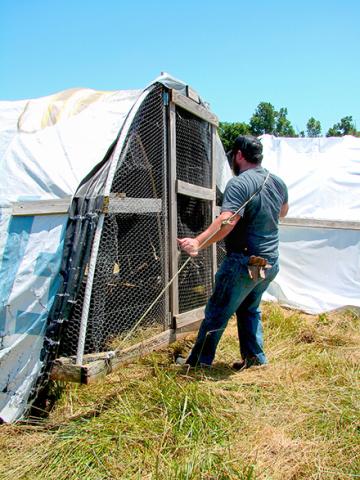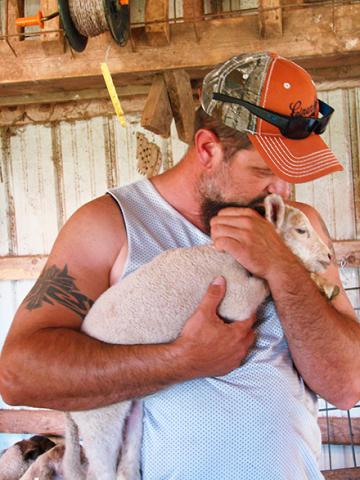Veterans Find a New Mission in Farming

A veteran learns how to move a chicken tractor across a pasture to raise pastured poultry, as part of the Agricultural Research Service, the University of Arkansas and the National Center for Appropriate Technology’s Armed to Farm program to help veterans explore careers in agriculture. (Sarah Bramall, D4074-1)
After serving 8 years in the U.S. Marine Corps, Travis Appel wasn’t sure what he wanted to do for a living.
He grew up on a small cattle farm in Springdale, Arkansas, and before enlisting, he had attended a community college near his home. But he was having a hard time choosing a career.
“I wanted to do something that would be a service to the community, but really that was all I knew,” he says.
He started taking classes at the University of Arkansas (UA) in nearby Fayetteville and met a technician who helped conduct agricultural research. The technician, David Dickey, became his mentor.
“He had a lot of knowledge and passion about farming, and that passion kind of bled into me,” says Appel.
Appel interned with Dickey as part of a program designed to encourage veterans to explore careers in agriculture. The program is operated jointly by the Agricultural Research Service (ARS), the university’s Division of Agriculture, and the National Center for Appropriate Technology (NCAT). Known as the Military Veteran Small Farms Program, it operates with help from nonprofit organizations, volunteers, and USDA grants. Over the past 10 years, it has helped 600 veterans get a taste of farming, start a small farm, or improve on the myriad of skills required to make it as a farmer. The veterans come from across the United States, but most are from Arkansas and other southern states.
“There’s a need for more young people to get into farming, and our veterans have many of the qualities that would help anyone interested in a career in agriculture, such as passion, discipline, and a sense of service,” says Annie Donoghue, who is the research leader in the ARS Poultry Production and Product Safety Research Unit in Fayetteville and coordinates the program with university colleagues.
The program taps into the expertise of ARS scientists, UA faculty, and NCAT staff. It primarily offers training in the types of small farming operations found in the region: poultry production, small ruminant production (sheep and goats), and agroforestry, which uses forests and wooded landscapes with marginal soils in productive ways. They are also working on adding beef cattle production into the training.
A Different Kind of Boot Camp
Instruction is provided in workshops, internships, more than 35 online courses, and residential “boot camps” at the university’s campus. Veterans might learn how to graze ruminants, build a portable poultry shed that can be moved across a pasture, raise poultry for eggs, or manage finances. An online Social Media Workbook explains how to use Facebook, Instagram, and Twitter as marketing tools. In some cases, USDA grants cover lodging and meal costs for veterans who stay overnight at the workshops and boot camps. Funding is provided with a National Institute of Food and Agriculture Beginning Farmer and Rancher Development Program grant. Partners include the ARS Dale Bumpers Small Farms Research Center in Booneville, Arkansas, and the Farmer Veteran Coalition.
Veterans signing up for internships are often paired with mentors who are veterans themselves. “We try to gear the internships as much as possible to the needs and the interests of each veteran,” Donoghue says.
Cory Bryk, a U.S. Marine Corps veteran, agreed to serve as a mentor because he found it invaluable to be mentored when he started raising poultry in Boone, North Carolina, in 2012. “I’m one of those people who likes to help others in the same ways that I’ve been helped,” he says.

At an Armed to Farm Boot Camp in Fayetteville, Arkansas, a veteran cares for a lamb as part of a weeklong training in the Military Veteran Small Farm Program. (Hannah Rivera, D4075-1)
Bryk has since moved to Lenoir, where he raises up to 2,000 chickens a year, sells them at farmer’s markets, restaurants, and retail outlets, and promotes his family farm on a web site. His 46-acre farm is in the southern Appalachian Mountains, a region where flat, tillable land is scarce and poultry production is one of the few viable options for anyone interested in farming. He usually mentors two interns each year, versing them in the intricacies of transforming newly hatched chicks into pasture-raised, marketable birds—and the best options for processing and marketing them.
“I try to teach them so that they are at a point where they can avoid the mistakes that I made and they’re not losing out when they go off on their own,” he says.
Mentors are unpaid, and that’s okay, Bryk says. It’s good to be part of a program that helps veterans make a transition to civilian life. “It can be hard when you get out of the service and you’re not sure what to do,” he says.
Military Work Ethic Stays With You
Appel, who interned in 2013, has been farming for 5 years and says that agriculture has been a good fit for him at least in part because of his military experience. “I know after being in the Marines, it suited me. The work ethic you develop is something that stays with you. You can’t just call in sick, and having a never-quit attitude just goes with the territory. Veterans and people in the military are used to working hard, and you need that in farming.”
He says he is grateful to his mentor and to the program for preparing him for many of the vagaries of farming, including fluctuating crop prices, insect damage, and excessive rainfall (a common threat in the spring in Arkansas).
“They showed me there were other local farmers who were doing things that worked for them and that there isn’t just one way of doing things. You can learn what will work for you,” he says.
Appel sells his produce at local farmer’s markets and at a roadside store he and his family recently opened on the farm. They also can many of the fruits and vegetables in their kitchen and use Instagram and Facebook to get word out to their 4,000 followers about farmer’s market appearances, store hours, and the seasonal commodities they’re selling. He recently offered a new group of interns the chance to see his operation at an open house.
“I feel like I want to give something back,” he says.
More information about the program is available here.—By Dennis O’Brien, ARS Office of Communications.







